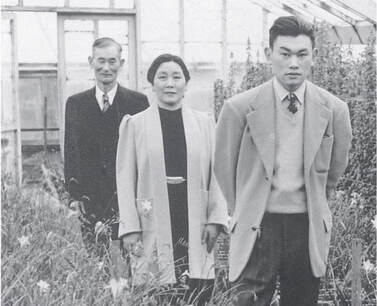 "A young Fred Korematsu" "A young Fred Korematsu" Pre-DeclarASIAN-me was a shy, awkward preteen who just wanted to fit in. It was a version of me that would bring down my own culture to make someone laugh. No one in my family was very involved in social-activism, and so I grew up unaware that "Asian-pride activism" was a thing. Until in eighth grade, I was introduced to my National History Day project. Mr. Fred T. Korematsu. Fred Korematsu was the son of Japanese immigrants in the 1900s, a bad time to be a Japanese-American. In 1942, the United States erected dozens of Japanese internment camps across the country. Japanese-Americans were rounded up and sent to these detention camps where they lived in poor conditions and faced harsh discrimination. President Roosevelt's signing of Executive Order 9066 authorized the U.S. military to take this action. Korematsu chose to defy this. He was an American citizen, and he was determined to continue living as one. But on May 30, 1942, he was arrested simply because he was a Japanese American who wasn't in an internment camp. In jail, Korematsu was approached by Ernest Besig of the ACLU, who helped him testify his case all the way to the Supreme Court. Korematsu argued that the discriminatory conviction was a violation of his civil rights and liberties guaranteed by the United States Constitution. In the end, the high court ruled against Korematsu in a 6 to 3 decision, on the basis that the incarceration was a military necessity. In 1976, Korematsu's courage was finally acknowledged when President Gerald Ford signed an official proclamation apologizing for the internment and terminating the Executive Order 9066 once and for all. Finally in 1988, President Ronald Reagan signed the Civil Liberties Act of 1988 to provide financial restitutions for each survivor of the camps to pay for damages, although now it is still debatable whether that really made up for all of the mental and physical damages the internment camps caused. Korematsu's stand was not only important for the advancement of Japanese-American rights, it was also crucial for the development of the United States' attention to civil liberties as well. Author: Carina Sun
0 Comments
Leave a Reply. |
In Honor of Asian Pacific American Heritage MonthWe are bringing you the stories of inspirational Asian Americans from history. Read More:5/30/20 - The Exceptional Example Ronald Takaki Set
5/27/20 - The Incredible Legacy of Kalpana Chawla 5/26/20 - When Marrying a Non-American Meant Losing Your Citizenship 5/25/20 - Honoring the 442nd Infantry Regiment 5/24/20- A Glimpse at Asian-Americans in Hollywood -- Miyoshi Umeki 5/22/20 - The Oriental Schools of San Fransisco 5/21/20 - Equality For All Colors - Yick Wo v. Hopkins 5/20/20 - An End To Police Brutality: Peter Yew's Stand 5/19/20 - Finding His Form: Linsanity in 2012 5/18/20 - Internment and Injustice: Fred T. Korematsu 5/17/20 - The Courageous Stand of Gene Viernes and Silme Domingo 5/16/20 - The Unbreakable Spirit of Wong Kim Ark 5/15/20- The Admirable Perseverance of Patsy Takemoto Mink 5/13/20 - The Lasting Legacy of Grace Lee Boggs 5/12/20-Remembering "The Forgotten" -- The Chinese migrants who built America's first Transcontinental railroad 5/11/20 - The Singing Neurosurgeon: Dr. Ayub Ommaya |

 RSS Feed
RSS Feed